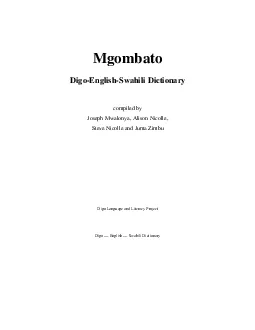PPT-African Cultures Arab, Ashanti, Bantu, & Swahili
Author : min-jolicoeur | Published Date : 2018-12-09
Standards SS7G4 The student will describe the diverse cultures of the people who live in Africa a Explain the differences between an ethnic group and a religious
Presentation Embed Code
Download Presentation
Download Presentation The PPT/PDF document "African Cultures Arab, Ashanti, Bantu, &..." is the property of its rightful owner. Permission is granted to download and print the materials on this website for personal, non-commercial use only, and to display it on your personal computer provided you do not modify the materials and that you retain all copyright notices contained in the materials. By downloading content from our website, you accept the terms of this agreement.
African Cultures Arab, Ashanti, Bantu, & Swahili: Transcript
Download Rules Of Document
"African Cultures Arab, Ashanti, Bantu, & Swahili"The content belongs to its owner. You may download and print it for personal use, without modification, and keep all copyright notices. By downloading, you agree to these terms.
Related Documents














